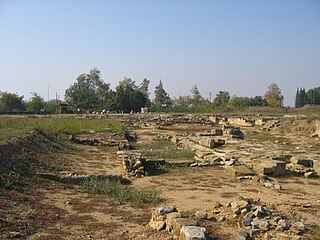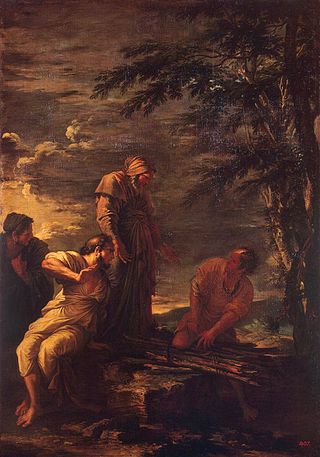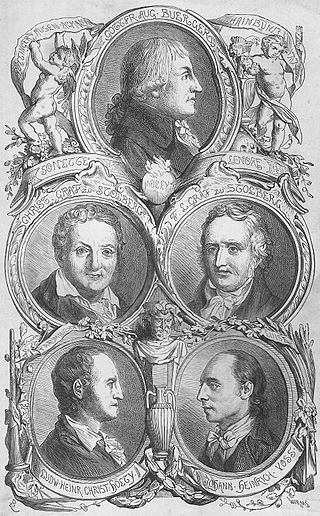Related Research Articles

Abdera is a municipality in the Xanthi regional unit of Thrace, Greece. In classical antiquity, it was a major Greek polis on the Thracian coast.

Democritus was an Ancient Greek pre-Socratic philosopher from Abdera, primarily remembered today for his formulation of an atomic theory of the universe.

Heraclitus was an ancient Greek pre-Socratic philosopher from the city of Ephesus, which was then part of the Persian Empire.

Protagoras was a pre-Socratic Greek philosopher and rhetorical theorist. He is numbered as one of the sophists by Plato. In his dialogue Protagoras, Plato credits him with inventing the role of the professional sophist.

Satire is a genre of the visual, literary, and performing arts, usually in the form of fiction and less frequently non-fiction, in which vices, follies, abuses, and shortcomings are held up to ridicule, often with the intent of exposing or shaming the perceived flaws of individuals, corporations, government, or society itself into improvement. Although satire is usually meant to be humorous, its greater purpose is often constructive social criticism, using wit to draw attention to both particular and wider issues in society.
Pre-Socratic philosophy, also known as Early Greek Philosophy, is ancient Greek philosophy before Socrates. Pre-Socratic philosophers were mostly interested in cosmology, the beginning and the substance of the universe, but the inquiries of these early philosophers spanned the workings of the natural world as well as human society, ethics, and religion. They sought explanations based on natural law rather than the actions of gods. Their work and writing has been almost entirely lost. Knowledge of their views comes from testimonia, i.e. later authors' discussions of the work of pre-Socratics. Philosophy found fertile ground in the ancient Greek world because of the close ties with neighboring civilizations and the rise of autonomous civil entities, poleis.
This article concerns the period 379 BC – 370 BC.

Johann Joachim Winckelmann was a German art historian and archaeologist. He was a pioneering Hellenist who first articulated the differences between Greek, Greco-Roman and Roman art. "The prophet and founding hero of modern archaeology", Winckelmann was one of the founders of scientific archaeology and first applied the categories of style on a large, systematic basis to the history of art. Many consider him the father of the discipline of art history. He was one of the first to separate Greek Art into periods, and time classifications.

Christoph Martin Wieland was a German poet and writer. He is best-remembered for having written the first Bildungsroman, as well as the epic Oberon, which formed the basis for Carl Maria von Weber's opera of the same name. His thought was representative of the cosmopolitanism of the German Enlightenment, exemplified in his remark: "Only a true cosmopolitan can be a good citizen."

In Greek mythology, the Hyperboreans were a mythical people who lived in the far northern part of the known world. Their name appears to derive from the Greek ὑπέρ Βορέᾱ, "beyond Boreas", although some scholars prefer a derivation from ὑπερφέρω.
History of Materialism and Critique of Its Present Importance is a philosophical work by Friedrich Albert Lange, originally written in German and published in October 1865. Lange vastly extended the second edition published in two volumes in 1873–75. A three-volume English translation of the opus was published 1877–81.

Ancient Greek literature is literature written in the Ancient Greek language from the earliest texts until the time of the Byzantine Empire. The earliest surviving works of ancient Greek literature, dating back to the early Archaic period, are the two epic poems the Iliad and the Odyssey, set in an idealized archaic past today identified as having some relation to the Mycenaean era. These two epics, along with the Homeric Hymns and the two poems of Hesiod, the Theogony and Works and Days, constituted the major foundations of the Greek literary tradition that would continue into the Classical, Hellenistic, and Roman periods.
Hecataeus of Abdera or of Teos, was a Greek historian who flourished in the 4th century BC. Though none of his works survive, his writings are attested by later authors in various fragments, in particular his Aegyptica, a work on the society and culture of the Egyptians, and his On the Hyperboreans. He is one of the authors whose fragments were collected in Felix Jacoby's Fragmente der griechischen Historiker.

Teos or Teo was an ancient Greek city on the coast of Ionia, on a peninsula between Chytrium and Myonnesus. It was founded by Minyans from Orchomenus, Ionians and Boeotians, but the date of its foundation is unknown. Teos was one of the twelve cities which formed the Ionian League. The city was situated on a low hilly isthmus. Its ruins are located to the south of the modern town of Sığacık in the Seferihisar district of Izmir Province, Turkey.
Geoponici, or Scriptores rei rusticae, is a collective term for the Greek and Latin writers on husbandry and agriculture. In classical times this topic was regarded as a branch of economics.

Weimar Classicism was a German literary and cultural movement, whose practitioners established a new humanism from the synthesis of ideas from Romanticism, Classicism, and the Age of Enlightenment. It was named after the city of Weimar, Germany, because the leading authors of Weimar Classicism lived there.

The Göttinger Hainbund was a German literary group in the late 18th century, nature-loving and classified as part of the Sturm und Drang movement.
Abderites or Abderite may refer to:

A town of fools is the base of a number of joke cycles found in various cultures. Jokes of these cycles poke fun at the stupidity of the inhabitants of a real or fictional populated place. In English folklore the best known butt of jokes of this type are the Wise Men of Gotham. A number of works of satire are set in a town of fools.
References
- 1 2 3 Garland, Henry Burnand; Garland, Mary (1976). The Oxford Companion to German Literature. Clarendon Press. p. 2. ISBN 978-0-19-866115-3.
- 1 2 Palmeri, Frank (2003). Satire, History, Novel: Narrative Forms, 1665-1815. University of Delaware Press. pp. 218–9. ISBN 978-0-87413-829-0.
- ↑ Dewald, Jonathan (2004). Europe 1450 to 1789: encyclopedia of the early modern world. Charles Scribner's Sons. p. 211. ISBN 978-0-684-31206-4.
- ↑ Closs, August; Stahl, Ernest Ludwig; Yuill, William Edward; M. Q. Smith (1970). German literature of the eighteenth and nineteenth centuries. Barnes & Noble. p. 100.